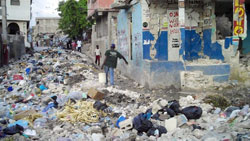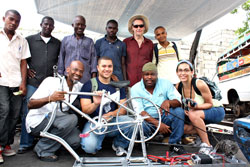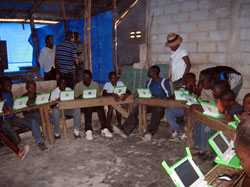
| Vol.
XXII No.
4 March / April / May 2010 |
| contents |
| Printable Version |
From The Faculty Chair
MIT in Action in Haiti
While the devastation in Haiti may have slipped off the front pages, colleagues at MIT continue to help our neighbors address their monumental challenges. Moreover, the Provost has asked Associate Provost Philip Khoury and me to help develop a long-term strategy for MIT initiatives in Haiti. Thus I would like to use this column to highlight two examples of the fantastic things our faculty and students are doing in Haiti, and to outline the priorities that are emerging for MIT’s ongoing involvement. Please read this as an invitation to join in applying your energy and expertise to these efforts.
Two weeks ago, Michel DeGraff, Dale Joachim, and Barry Vercoe led several project teams of students from their Media Lab class to Haiti. Here is an excerpt from the students’ report on their work, taken from the blog by Amritaa Ganguly.
In early February I signed up for a new class at the Media Lab titled MAS.963: New Media Projects for Haiti. After eleven weeks of lectures on Haitian culture, the French/Haitian Creole debate, education, health and sustainable development our group of seven students and three professors (Michel DeGraff, Dale Joachim and Barry Vercoe) went to Haiti for the last week of April.
Our class split into three main focus groups. Marvin Arnold and Daryl Fairweather created a system for generating electricity using pedal power. Clinton Scroggins and Asha Martin focused on using art, drama and dance to promote self-expression in children. Jessica Kim, Anila Sinha and I worked on water issues. Jess and Anila focused on distributing D-Lab's water testing kits while I focused on water and sanitation media campaigns.
The reality of traveling to Haiti didn't strike me until we were already in the center of Port-au-Prince, driving around the collapsed presidential palace, on our way to the hotel. Our group had seen poverty before, in India, Brazil, and Rwanda, but the view of thousands and thousands of people living in gray tents with USAID stamps was surreal.

(click on image to enlarge)
Where there once were buildings was now piles of rubble and cement blocks. Peering out the window of our bus that first night, it didn't seem like our projects would have any impact on the situation around us. But, by the end of the week we were sure, that for us seniors, this trip was our most worthwhile experience at MIT and, in the end, the implementation of all of our projects turned out successful.

(click on image to enlarge)
With the pedal power group we traveled to Carrefour to meet with Mr. Narcisse, an auto mechanic, at his Technique Club Garage. As Marvin and Daryl described their setup for a pedal power electricity generator the mechanic kept shaking his head and exclaimed that this was "easy" and that their design would be something that he would be extremely interested in building. When Marvin asked him "If this is so easy why hadn't you thought of it before?" the mechanic responded that he hadn't had the idea. From their idea the mechanic employed his own ingenuity and eventually adapted their project into his own, with plans to make additional units for regions in dire need of energy and to teach other mechanics as well.

(click on image to enlarge)
With Asha and Clinton we headed to Plas Timoun, a school catering to six- to 10-year-olds held in six school buses donated by the first lady of the Dominican Republic. Professor Vercoe introduced the children to the Speak program on the One Laptop Per Child machines and Asha and Clinton led activities with step dancing, arts and crafts. It was an uplifting experience to interact with children who are able to smile, dance and sing despite the hardships they are facing.
During the week our water group spoke to many representatives from from DINEPA (Direction Nationale de l’Eau Potable et de l’Assainissement – National Direction for Drinking Water and Sanitation), the government agency in charge of water and sanitation issues as well as NGOs. We attended Water and Sanitation Hygiene cluster meetings led by UNICEF to learn more about the public sanitation and health campaigns as well as to present D-Lab's water testing kit. Our group handed out five kits to AIDs/HIV clinics, schools and NGOs. One example test we conducted on government supplied water from CAMEP showed a presence of e-coli.
Along the way we encountered so many people with such incredible stories. We visited a primary school in Darbonne, which was now held in a tent after their school had completely collapsed. We spoke to university students like ourselves who are eager to help in the rebuilding process but don't know where to start. We spoke to the President of the State University Jean-Vernet Henry who described his quest to rebuild Haiti's universities.
Among the hardest stories we heard this past week was that of Haiti's Faculté de Linguistique Appliquée (FLA), the Linguistics Department of the State University. In35 seconds the academic unit lost its dean, vice-dean, faculty members and more than 200 students after their four story building completely collapsed. One of the professors described that he was on the first floor of the school, in the dean’s office, when the earthquake happened. He fell to the floor and managed to curl up. When the earthquake stopped he could see a small tunnel leading out of the rubble but it was too narrow for his shoulders. He waited 30 minutes for some of his surviving friends to dig him out with an ice pick while he listened to one of his students in the next room crying for help because he had lost a foot.
From the pile of rubble, some of the remaining professors and students have managed to salvage a meager amount of damaged textbooks. I will never forget the joy on the professors' faces as they skimmed through the titles of the four boxes of books donated by MIT Press. This was the first gift of books that they have received since the earthquake.
Our week in Haiti has provided us with a learning experience unlike any other. We can only ask that the administration, faculty and students at MIT reach out to their colleagues in Haiti during this rebuilding process, creating new partnerships with Haitian universities, the Haitian government, the Haitian population both in Haiti and in the Diaspora, and with those aid organizations that best serve the country's interests.
| Back to top |
A second example comes from a team from MIT Lincoln Laboratory, the Center for Transportation and Logistics, and the Sloan School of Management that has been taking stock of the state of food, shelter, water, health, and security for residents of Haiti at the request of the U.S. military’s Joint Task Force in Haiti, known as JTF-Haiti. Initially tasked with humanitarian assistance and disaster relief, JTF-Haiti soon took on a role of coordinating and collaborating with lead agencies such as the U.S. Agency for International Development and the U.N. Stabilization Mission in Haiti. To serve the entire community, JTF-Haiti initiated a data collection effort that drew on expertise from many organizations, and specially-trained personnel gathered in-person information from hundreds of displaced individuals, camp leaders, and health facility workers on a rolling basis every day for some two months, recently completing the first phase of the effort.
The project was initiated in late January, when the need for information became clear to Dr. Marc Zissman, Assistant Head of the Communication Systems and Cyber Security Division at MIT Lincoln Laboratory, who was called to Port-au-Prince to support the JTF-Haiti efforts. Dr. Zissman contacted MIT campus colleagues, asking for help, and eventually assembled a wider team. Now, Dr. Israel Soibelman, Division Head of Homeland Protection and Air Traffic Control at Lincoln Lab and colleagues from across Lincoln Lab are involved, as is the ad-hoc MIT campus team that first formed in early February.
The all-volunteer campus team paired nine graduate students from across MIT and elsewhere – some lining up class projects, others simply volunteering – with Dr. Jarrod Goentzel, director of the Master of Engineering in Logistics Program and the Humanitarian Logistics Research Project, and MIT Sloan Senior Lecturer Dr. Anjali Sastry, along with ESD PhD student Erica Gralla. The team developed a set of white papers to present context and background to stakeholders, then examined the data as it came in, identifying questions, assessing trends, and helping to develop a picture of needs as the situation unfolded.
The students spent much of their spring break working at MIT, and gave up weekends and early mornings to meet and collaborate. A subset focused on one critical area – housing – asking what the existing literature and the incoming data suggested about potential interactions and trajectories.
The campus team is now refining their final analysis of data collected in Haiti and documenting lessons learned, which will be combined into a final report. Lincoln Lab is organizing a day-long “After Action Review” to further consolidate insights gained through the data collection and analysis effort in Haiti. The combined MIT team aims to share materials and participate in the wider dialog about how to better manage and assess efforts in humanitarian emergencies.
An Ongoing MIT Strategy?
These projects illustrate MIT at its best. In addition to coordinating and supporting proposals like these that bubble up from faculty and students, I see two ways in which MIT might be helpful to Haiti on an on-going basis, both of which reflect requests for this assistance received from Haitian leaders.
The first way would be to help rebuild the country’s university system. Most of the physical facilities occupied by the State University System (UEH) and by private universities have been destroyed, and over 3,000 faculty members and 12,000 to 15,000 students perished in the earthquake. A new state university system needs to be built.
The UEH Recteur has written to President Hockfield requesting our assistance in helping to build consensus around a vision and strategy for the UEH. MIT, either acting on its own or in partnership with other universities, could assist in this process and perhaps help organize joint initiatives and potential exchanges for students and faculty – at the UEH and possibly some of the private universities.
The second potential initiative was requested by Mr. Patrick Delatour, Chairman of Haiti’s Presidential Commission for Reconstruction, during his visit to MIT in April. An Interim Recovery Commission, co-chaired by Prime Minister Jean-Max Bellerive and President Clinton, has been created to make decisions on how to allocate resources from donors to specific projects. Minister Delatour indicated that there is a pressing need to assist the Commission in developing and training a staff of professionals to review, process, and make recommendations among funding priorities. A number of our colleagues in MIT’s Urban Planning Department are now following up on this request to explore how they might help the Commission develop these professional capabilities.
If you would like to join any of these initiatives or have additional ideas, please contact Philip Khoury (khoury@mit.edu) or me (tkochan@mit.edu).
| Back to top | |
| Send your comments |
| home this issue archives editorial board contact us faculty website |